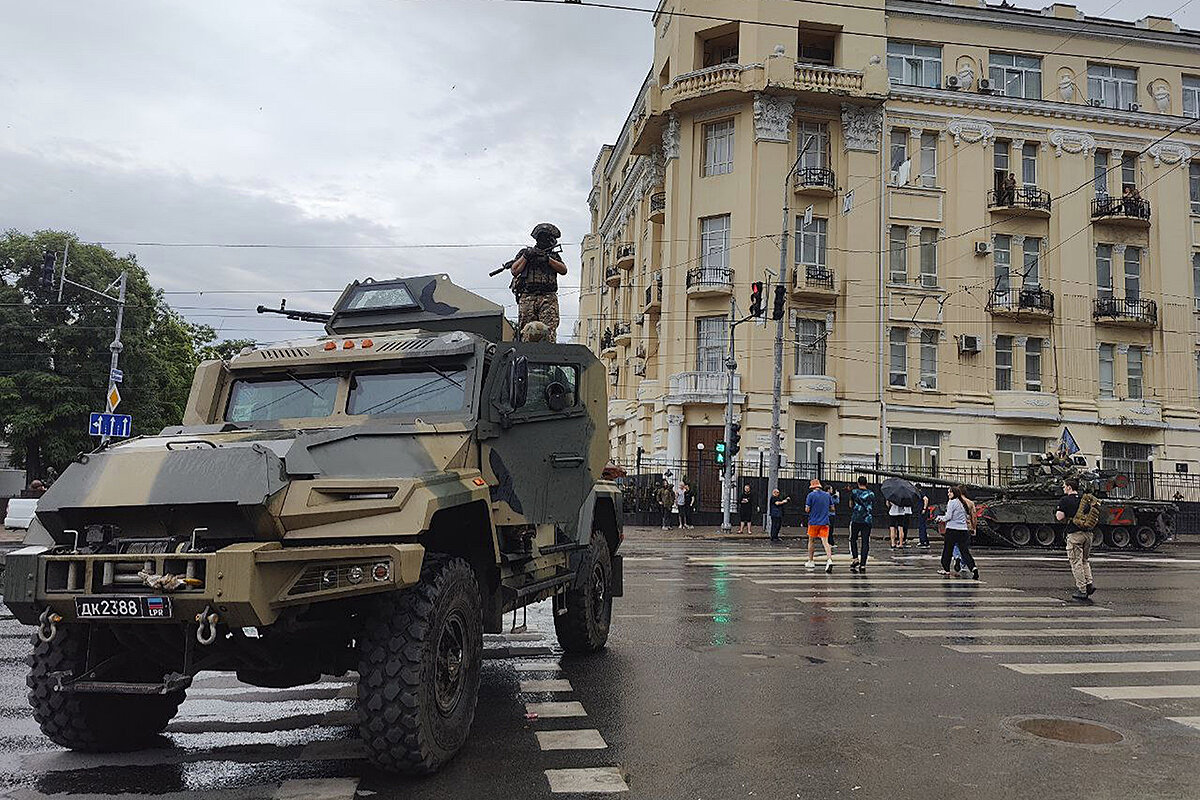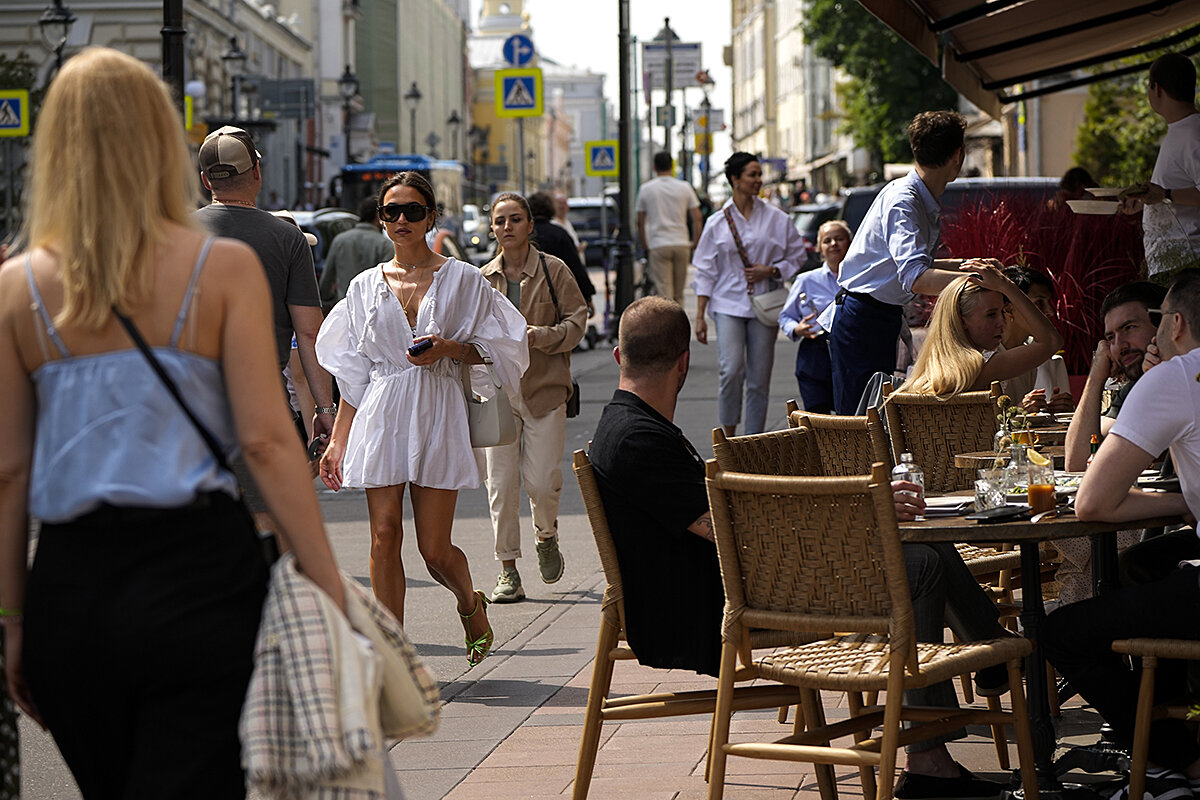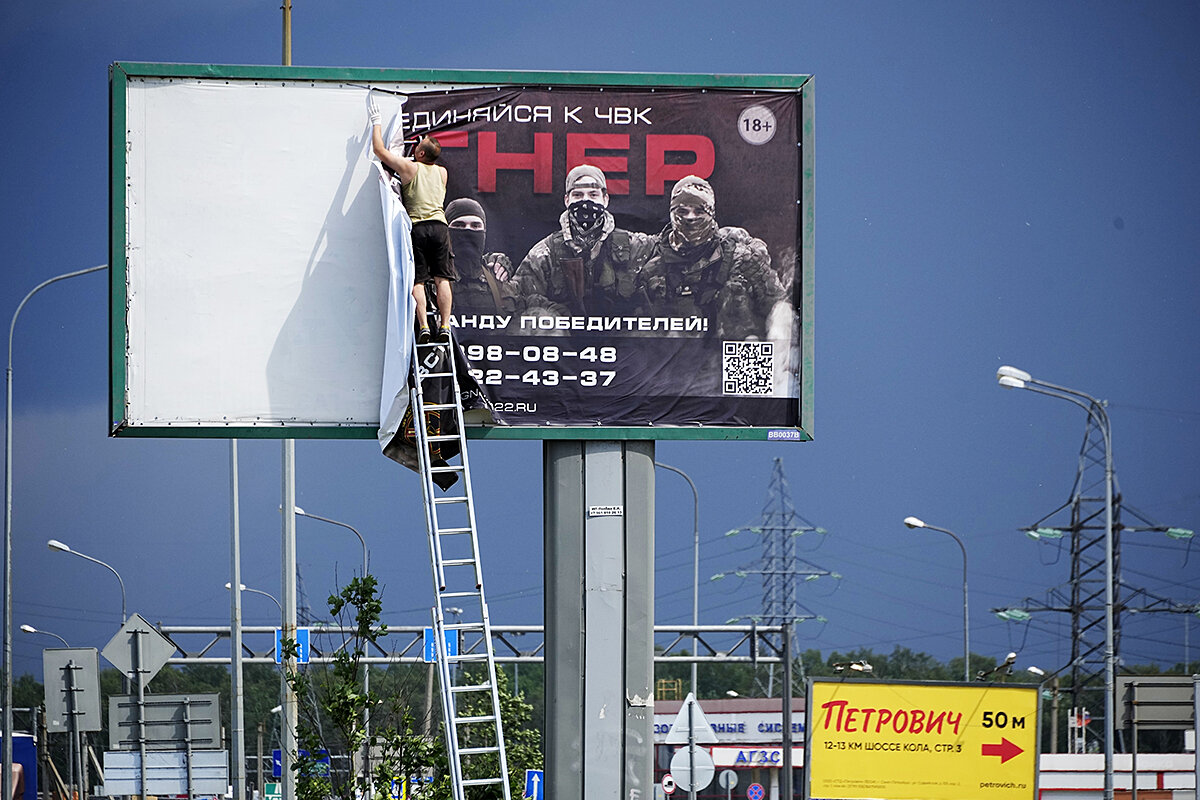After the rebellion, how well will Putin carry on his rule?
Loading...
| Toronto
When oligarch Yevgeny Prigozhin led his 25,000-strong Wagner private military forces into open insurrection against Russia’s Defense Ministry and Moscow elites this weekend, it looked like the kind of turning point that often occurs in Russian history.
But then the rebellion fell apart within hours.
Now Mr. Prigozhin appears set for exile in Belarus, and President Vladimir Putin – who called the Wagner rebellion an act of treason and a “stab in the back” – remains in power after a mostly bloodless weekend of military maneuvering. Yet a fierce debate has opened up among Russian experts over what long-term repercussions might unfold after this event.
Why We Wrote This
Yevgeny Prigozhin’s attempted rebellion didn’t topple President Vladimir Putin. But in its aftermath, it has launched debate over just how stable Mr. Putin’s hold on the country really is.
The brief and peacefully resolved rebellion revealed deep divisions within Russia’s military establishment, and forced Mr. Putin to make awkward compromises with a powerful oligarch whom he had labeled a “traitor” just one day earlier.
Some point to the August 1991 coup by Soviet hard-liners, which was defeated within days by popular protests, but so deeply undermined the sagging foundations of Communist power that the Soviet state collapsed within months. Mr. Putin himself , when a “great state” was destroyed by “intrigues and squabbles,” leading to the loss of vast territories and a catastrophic civil war.
Russians are famously averse to instability, and the relatively recent experience of Soviet collapse and a decade of chaos that followed is very much a factor in their attitudes. Some commentators argue that the main public reaction to Mr. Putin’s swift resolution of the crisis will be relief that the specter of civil war was averted, and that may even strengthen Mr. Putin in the short term.
“The thing that could have really harmed Putin would have been an armed confrontation between the Russian army and the Wagners,” says Sergei Markov, a former Putin adviser. “But this solution, by showing wisdom and mercy and ending the crisis peacefully, has made Putin stronger. It now establishes unity, especially if most of the Wagners now sign up with the regular army.”
“A negotiating Putin is not Putin”
Mr. Prigozhin appears to have prepared no sweeping plan to seize power, but may have hoped that Mr. Putin, or the Russian people, would back him after he almost bloodlessly occupied the Russian military headquarters in the southern city of Rostov-on-Don and sent expeditionary forces racing toward Moscow.
After several hours of negotiating with Belarusian President Alexander Lukashenko, a Putin ally, he agreed to cease his “justice march” to Moscow, send his troops back to their camps in Ukraine’s Luhansk region, and accept something that looks like exile for himself in Belarus. In return, all charges against Mr. Prigozhin and his men were dropped.
In a passionate statement Monday, Mr. Prigozhin insisted that his goal was never to overthrow the Russian government, but to “prevent the destruction of Wagner” after Mr. Putin had ordered the private army to disband and accept contracts with the regular Russian army by July 1. Another goal, he said, was to bring to justice those corrupt military leaders whose “gross incompetence” had led to many costly mistakes in the course of the “special military operation.”
Russian news sources report that thousands of Mr. Prigozhin’s men might join him in special camps being set up in Belarus, leaving Wagner a potential force to be reckoned with.
The failed Wagner rebellion has led some Russians, especially opposition figures and experts mostly in exile, to argue that the fragile underpinnings of Mr. Putin’s power have been exposed, and that his failure to deal decisively with Mr. Prigozhin’s challenge suggests that his authority has been diminished, perhaps fatally.
“A palace coup is now closer. Putin didn’t lose the support of the people; he lost support of those his power depends upon,” says Leonid Gozman, a liberal opposition leader who is now abroad. “Regular Russians are very well attuned to these things, and they will distance themselves from the authorities even more than before.”
Andrei Kolesnikov, a Carnegie expert who is still working in Russia, wrote in a draft commentary provided to the Monitor that the Prigozhin affair “destroyed the blissful ... picture, so important for Putin. After all, his regime is based not on active support, but on the indifference of the majority of citizens. In a difficult moment, they will not defend the president, but in exchange for calm and a relatively tolerable standard of living, they have been willing to indifferently support Putin’s initiatives and his war.”
And Abbas Gallyamov, a former Putin speechwriter now in exile, argues that “a negotiating Putin is not Putin. He is a person who suppressed all opposition. Taking into account that presidential elections are to be held next year, we may well see a project to anoint a successor to Putin, since his reputation has been greatly diminished.”
But others maintain that contemporary Russians, especially older ones who already experienced the Soviet collapse and the ensuing chaos, prize stability above all. They say that most Russians will not be disappointed that Mr. Putin defused a dangerous challenge by peaceful means, and at least his short-term position may well be strengthened.
Even though Mr. Prigozhin rose up against Moscow’s authority – importantly, a challenge that no military or civilians joined him in – he and his men are still regarded by most Russians as patriots who recently won a key battle for Russia in Bakhmut, and violent measures against them might have turned them into martyrs.
“I can’t really see how this outcome of the crisis somehow weakens Putin,” says Sergei Strokan, a columnist with the business daily Kommersant. “In a critical moment Putin stepped in and was able to find a nonviolent exit strategy very quickly. Whether you like Putin or not, he proved to be a successful crisis manager in this sticky situation. It was the happiest possible outcome, and it puzzles me that many people want to see it as a demonstration of weakness. What would have been disastrous for Putin, and Russia, would be the spectacle of Wagner forces in a pitched battle with the Russian army.”
Denis Volkov, director of the Levada Center, Russia’s only independent polling agency, says it’s too soon to judge. But Mr. Prigozhin’s rash actions, which led to the deaths of 12 Russian helicopter pilots he claimed were attacking his men, have probably cost him in public standing.
“In recent months, after Prigozhin’s victory in Bakhmut, a lot of people saw him as a truth-telling, successful military leader struggling against incompetence and corruption,” Mr. Volkov says. “But the mutiny has certainly undermined his reputation, and his rating is falling.”
“Putin resolved the crisis effectively and quickly”
Most experts agree that the affair has revealed the flaws in Mr. Putin’s system of power, which relies on being the supreme mediator among elite factions, interest groups, and personalities.
In the early stages of the war, the Kremlin wanted to fight a “special military operation” using mercenary forces, separatist militias, and units of contract soldiers, with minimal commitment of regular Russian forces. So Mr. Putin allowed Mr. Prigozhin to build his powerful, private Wagner army and criticize official military leaders.
But after military setbacks last autumn forced the Kremlin to declare a mobilization of reserves, the Wagner forces became redundant. Last month, Mr. Putin decreed that they be incorporated into the regular Russian army. He probably underestimated Mr. Prigozhin’s angry potential to defy that order.
“People have a right to ask how Putin allowed this situation to develop. Where was the commander in chief when Prigozhin was openly claiming the leaders of the army are incompetent, that the war is senseless, that Russia is losing?” says Mr. Strokan. “Another good question is, how did a private army perform so much better on the battlefield than Russia’s regular forces? A lot of people say Putin might use this situation to shuffle his top military leaders and tighten the screws in general. After all, a lot of what Prigozhin was saying made good sense.
“But most people will agree that Putin resolved the crisis effectively and quickly, and will be greatly relieved about that. I can’t see how that weakens Putin.”
Olga Podolskaya contributed reporting to this story from Moscow.











